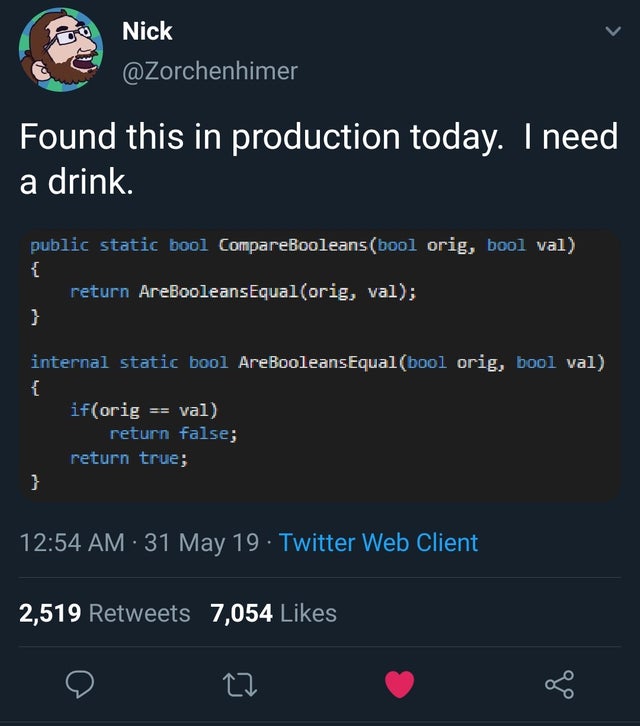Join devRant
Do all the things like
++ or -- rants, post your own rants, comment on others' rants and build your customized dev avatar
Sign Up
Pipeless API

From the creators of devRant, Pipeless lets you power real-time personalized recommendations and activity feeds using a simple API
Learn More
Related Rants

 How do you even come up with shit like this?
How do you even come up with shit like this? I found such a treasure today in the production code.
I found such a treasure today in the production code.
Top 12 C# Programming Tips & Tricks
Programming can be described as the process which leads a computing problem from its original formulation, to an executable computer program. This process involves activities such as developing understanding, analysis, generating algorithms, verification of essentials of algorithms - including their accuracy and resources utilization - and coding of algorithms in the proposed programming language. The source code can be written in one or more programming languages. The purpose of programming is to find a series of instructions that can automate solving of specific problems, or performing a particular task. Programming needs competence in various subjects including formal logic, understanding the application, and specialized algorithms.
1. Write Unit Test for Non-Public Methods
Many developers do not write unit test methods for non-public assemblies. This is because they are invisible to the test project. C# enables one to enhance visibility between the assembly internals and other assemblies. The trick is to include //Make the internals visible to the test assembly [assembly: InternalsVisibleTo("MyTestAssembly")] in the AssemblyInfo.cs file.
2. Tuples
Many developers build a POCO class in order to return multiple values from a method. Tuples are initiated in .NET Framework 4.0.
3. Do not bother with Temporary Collections, Use Yield instead
A temporary list that holds salvaged and returned items may be created when developers want to pick items from a collection.
In order to prevent the temporary collection from being used, developers can use yield. Yield gives out results according to the result set enumeration.
Developers also have the option of using LINQ.
4. Making a retirement announcement
Developers who own re-distributable components and probably want to detract a method in the near future, can embellish it with the outdated feature to connect it with the clients
[Obsolete("This method will be deprecated soon. You could use XYZ alternatively.")]
Upon compilation, a client gets a warning upon with the message. To fail a client build that is using the detracted method, pass the additional Boolean parameter as True.
[Obsolete("This method is deprecated. You could use XYZ alternatively.", true)]
5. Deferred Execution While Writing LINQ Queries
When a LINQ query is written in .NET, it can only perform the query when the LINQ result is approached. The occurrence of LINQ is known as deferred execution. Developers should understand that in every result set approach, the query gets executed over and over. In order to prevent a repetition of the execution, change the LINQ result to List after execution. Below is an example
public void MyComponentLegacyMethod(List<int> masterCollection)
6. Explicit keyword conversions for business entities
Utilize the explicit keyword to describe the alteration of one business entity to another. The alteration method is conjured once the alteration is applied in code
7. Absorbing the Exact Stack Trace
In the catch block of a C# program, if an exception is thrown as shown below and probably a fault has occurred in the method ConnectDatabase, the thrown exception stack trace only indicates the fault has happened in the method RunDataOperation
8. Enum Flags Attribute
Using flags attribute to decorate the enum in C# enables it as bit fields. This enables developers to collect the enum values. One can use the following C# code.
he output for this code will be “BlackMamba, CottonMouth, Wiper”. When the flags attribute is removed, the output will remain 14.
9. Implementing the Base Type for a Generic Type
When developers want to enforce the generic type provided in a generic class such that it will be able to inherit from a particular interface
10. Using Property as IEnumerable doesn’t make it Read-only
When an IEnumerable property gets exposed in a created class
This code modifies the list and gives it a new name. In order to avoid this, add AsReadOnly as opposed to AsEnumerable.
11. Data Type Conversion
More often than not, developers have to alter data types for different reasons. For example, converting a set value decimal variable to an int or Integer
Source: https://freelancer.com/community/...
rant
c#